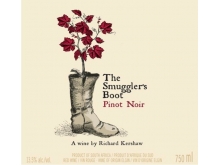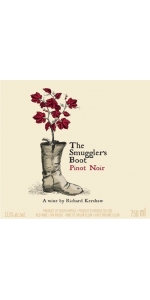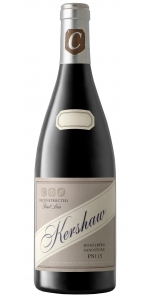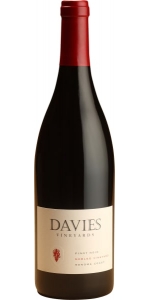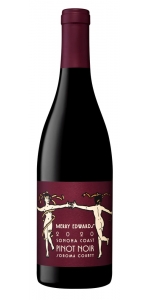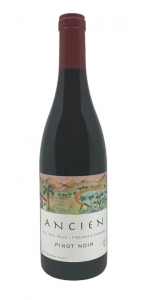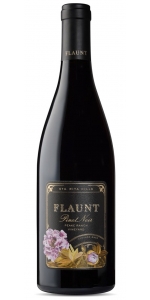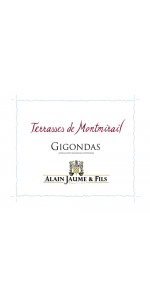Kershaw Smugglers Boot Pinot Noir 2020
| Country: | South Africa |
| Region: | Western Cape |
| Winery: | Kershaw |
| Grape Type: | Pinot Noir |
| Vintage: | 2020 |
| Bottle Size: | 750 ml |
Kershaw Smugglers Boot Pinot Noir is made from 100% Pinot Noir made from French clones PN667, PN115 and PN113.
The name derives from the time of trade embargoes in South Africa when growers & winemakers smuggled grapevine material into the country by hiding the cuttings in Wellington boots. The Smuggler’s Boot range celebrates that ingenuity.
Attractive strawberry, savory and star anise spice linger on the nose. Juicy and sumptuous on the mid palate with breadth of flavor offset by a nimbleness of fresh acidity, friable tannins and sinuous mouthfeel, this Pinot unwraps to earthy, fennel, chocolate and a hint of incense to a long supple finish.
Handpicked grapes were first bunch sorted on a conveyor before the stems were removed and the destemmed berries sorted to remove jacks and substandard berries. After a 3-day maceration in 500kg open-topped fermenters, the uncrushed grapes began a spontaneous fermentation. A gentle pigeage program was charted and the grapes remained on skins for 10-16 days.
The free-run wine was racked to a combination of 50% French oak barrels (10% new) and 50% breathable plastic eggs with the remaining pomace basket-pressed. Malolactic then proceeded followed by a light sulphuring after which the wine was racked off Malolactic lees and returned to cleaned barrels for an 11-month maturation. No finings, simply racked and light filtration prior to bottling.
Richard Kershaw’s personal suggestions for dishes include charcuterie, its salt and fat being complemented by the delicate spicy notes and fruit; Pork loin with honey, pepper, and lemon-zest glaze; Carpaccio; duck cassoulet; ovenroasted monkfish with garlic mashed potatoes; seared tuna; wild mushroom risotto; a simple beet salad with some hazelnuts and ricotta cheese; a slice of Brie or Gorgonzola dolce.
Kershaw Pinot Noir Deconstructed Kogelberg Sandstone PN115 is made from 100 percent Pinot Noir.
Only two barrels made. The inspiration for these Deconstructed Pinot Noir’s stems from my belief that the Elgin region boasts credentials that make it world-class. My mandate has been to prove that Elgin has a signature grape synonymous with the area and exhibits specific ‘terroirs’ (mesoclimates) within its demarcated boundary, reflecting regional distinctions. To fully comprehend this, it is necessary to dig deeper into the DNA that makes up our region. As such, I split Elgin into seven different sub-regions or zones whereby each zone identifies with a particular topographical or climatic nuance. Within these zones, I then selected specific vineyards and further an individual clone. This wine is from the South Western part of Elgin, in the Kogelberg biosphere. The Sandstone soils lend lightness, elegance and lift in the mid-palate, very subtle. PN115 tends to be more broad and structured but on these soils still has a lovely lift.
Tasting Notes : Light to medium cerise; intense and attractive aromas of strawberry, Bing cherry, orange peel and dark chocolate. The perfume lingers into the palate as the entry is medium-bodied, juicy, ripe and silky-textured. A pulsating acidity coated by fleshy red plums, cherry compote and tinned strawberry. Intermingled are wisps of incense, almost peat notes from an earthier wood content giving a beguiling interplay of wood and fruit. Complex with excellent concentration, the wine has a crushed velvet tannin and persistency that lingers on for many minutes.
Pair with roast duck breast with a raspberry glaze.
J. Davies Nobles Vineyard Pinot Noir is made from 100 percent Pinot Noir.
The 2020 Nobles Vineyard Pinot Noir’s aroma elegantly opens with blueberry compote, dark cherry and dried citrus peels, followed with a touch of baking spice and a hint of forest floor. The palate’s bright entry leads to notes of cranberry, red raspberry and a sprinkle of black tea, while a crisp acidity supports silky tannins to a clean finish.
Review:
Bountiful black-cherry flavors and good balance make this full-bodied wine difficult to resist. Black-fruit flavors are rich and well concentrated, backed by a light touch on the oak spices that emerge on the finish and add nice complexity.
-Wine Enthusiast 93 Points
This carries the forest green scent of the far-coast hills, a savory pinot noir with mineral intensity. The wine’s cherry-red fruit ripens on the eastern, leeward slopes of the second ridge in from the Pacific, that ripeness tamed by an earthy evergreen scent lasts for minutes, as if breathing the air at the edge of a redwood grove.
-Wine & Spirits 93 Points
The inviting nose offers up scents of Santa Rosa red plums, cassis, dried sweet figs and pomegranate backed by sandalwood and hints of tea rose. Bright and exciting on the palate, the entry begins with firm tannins and complex layers of red raspberries, bergamot tea, dried herbs and rose petal notes. Refreshing acidity carries the wine throughout the finish.
To match with the juicy acidity and bright nature of this wine, we offer up a vegan recipe for Spicy Quinoa with Asparagus and Shiitake Mushrooms. The shiitakes are a classic pairing with Pinot Noir, but when combined with the spicy ginger, garlic and crushed red pepper, all melds beautifully into a dish that pairs seamlessly with the 2020 Sonoma Coast Pinot Noir.
Review:
Aromas of spiced cherry, plum and fresh mint. Medium-to full-bodied with silky tannins. An interesting, well-balanced mix of fresh red and black fruit and savory spice. Good concentration. Drink or hold.
-James Suckling 93 Points
The 2020 Pinot Noir Sonoma Coast is ripe with raspberry candy, crushed rose petal, and turned earth. The tannins in the 2020 are a touch more present and emerge on the finish, and it also has more warmth. Drink this over the next 10 years.
-Jeb Dunnuck 93 Points
Ancien Pinot Noir Fiddlestix is made from 100 percent Pinot Noir.
The Fiddlestix Vineyard is located in the Sta. Rita Hills AVA, which straddle the Santa Ynez River as it makes its way to the Pacific Ocean. As an East-West oriented valley, opening its mouth to the cool Pacific breezes, the consistent and cooling marine influence is significant. The vineyard is managed and owned in partnership by Kathy Joseph, who has planted an array of clones and rootstocks on several, varied soils to create a staggering level of diversity from this single vineyard. The remarkably consistent weather, characterized by lower highs and higher lows than our North Coast vineyards, conspires with silica-laden, marine sedimentary soils to make wines of power and exceptional structure.
Fiddlestix always presents a bold Pinot Noir with notes of fruit and exotic spice. As the vines have aged, we noticed more and more underlying depth (they now are approaching their 25th vintage). The nose greets with notes of cassis, Indian spice, and hints of incense. Fresh dark fruits lead the palate, and the focus settles on ripe flavors of blackberry and currants spiced with peppercorn/allspice. Velvety and softly chewy tannins emphasize structure, while ever-present acidity balances and brightens. The spicy aromatics and flavors continue through the long finish.
Flaunt Pinot Noir Peake Ranch Vineyard Santa Rita Hills is made from 100% Pinot Noir.
Review:
"A light shade of ruby in the glass, this single-vineyard expression pops on the nose with fresh Bing cherry, strawberry, curry leaf and carnation aromas. The palate is very zesty as well, with a taut texture that presents flavors of smashed currant, melon rind, crunchy sage and wild thyme. - MATT KETTMANN"
- Wine Enthusiast (April 2022), 94 pts
Kershaw Smugglers Boot Pinot Noir is made from 100% Pinot Noir made from French clones PN667, PN115 and PN113.
The name derives from the time of trade embargoes in South Africa when growers & winemakers smuggled grapevine material into the country by hiding the cuttings in Wellington boots. The Smuggler’s Boot range celebrates that ingenuity.
Attractive strawberry, savory and star anise spice linger on the nose. Juicy and sumptuous on the mid palate with breadth of flavor offset by a nimbleness of fresh acidity, friable tannins and sinuous mouthfeel, this Pinot unwraps to earthy, fennel, chocolate and a hint of incense to a long supple finish.
Handpicked grapes were first bunch sorted on a conveyor before the stems were removed and the destemmed berries sorted to remove jacks and substandard berries. After a 3-day maceration in 500kg open-topped fermenters, the uncrushed grapes began a spontaneous fermentation. A gentle pigeage program was charted and the grapes remained on skins for 10-16 days.
The free-run wine was racked to a combination of 50% French oak barrels (10% new) and 50% breathable plastic eggs with the remaining pomace basket-pressed. Malolactic then proceeded followed by a light sulphuring after which the wine was racked off Malolactic lees and returned to cleaned barrels for an 11-month maturation. No finings, simply racked and light filtration prior to bottling.
Richard Kershaw’s personal suggestions for dishes include charcuterie, its salt and fat being complemented by the delicate spicy notes and fruit; Pork loin with honey, pepper, and lemon-zest glaze; Carpaccio; duck cassoulet; ovenroasted monkfish with garlic mashed potatoes; seared tuna; wild mushroom risotto; a simple beet salad with some hazelnuts and ricotta cheese; a slice of Brie or Gorgonzola dolce.
Review:
"This is a well-priced, nicely balanced Pinot Noir from Richard Kershaw that combines raw material from Elgin and the Hemel-en-Aarde Valley. Sappy, juicy and refreshing, with scented 20% new oak, pomegranate and wild strawberry fruit and a nip of tannin. 2022-27"
- Tim Atkin (South Africa Report 2022), 95 pts
Surrounded by mountains, the Elgin district sits in the Western Cape of South Africa. The year-round cool climate is perfect for producing grapes with rich, subtle flavors.
Focusing on apposite noble grapes, i.e. ones with the ability to produce world-class examples, our Kershaw Elgin Chardonnay, Syrah and Pinot Noir and Kershaw Deconstructed Chardonnay and Syrah are made by South Africa’s only winemaking Master of Wine, Richard Kershaw.
Richard Kershaw Wines was established in January 2012 to create clonally selected, site-specific, cool climate wines in the Elgin Valley, South Africa’s coolest wine region. Focusing on apposite noble grapes, i.e. ones with the ability to produce world-class examples, our Kershaw Elgin Chardonnay, Syrah and Pinot Noir and Kershaw Deconstructed Chardonnay and Syrah are made by South Africa’s only winemaking Master of Wine, Richard Kershaw.
Winery Philosophy: Our commitment is to make the best wines possible from the vine clones best suited to our unique terroir. Our grapes are grown in the cool climate vineyards of Elgin in the Western Cape of South Africa. We produce only a very limited number of cases of Kershaw Elgin Chardonnay and Kershaw Elgin Syrah each vintage. Our aim always is to produce some of the best wines of their style in South Africa.
Owner: Richard Kershaw MW
Date Founded: January 2012
Born and raised in the UK, Richard travelled extensively before settling in South Africa in 1999 to make wine full time. He established Richard Kershaw Wines in January 2012 to create clonally selected, site-specific, cool climate wines in the Elgin Valley, the country’s coolest wine region, choosing to focus on apposite noble grapes (ones with the ability to produce world-class examples) and now has a stable of award-winning, much in demand wines including Kershaw Elgin Chardonnay, Syrah and Pinot Noir and Kershaw Deconstructed Chardonnay and Syrah.
One of only 10 Masters of Wine who actively make their own wines and South Africa’s only winemaking Master of Wine, Richard is much in demand when not in the vineyard or cellar. A wine show judge for many prestigious competitions around the globe, he is also part of the educational panel for the Institute of Masters of Wine, lectures for the WSET (Wine & Spirit Education Trust) in South Africa, and shares the breadth of his knowledge with students and consumers via talks, tastings and blogs.
Our grapes are grown in the cool climate vineyards of Elgin in the Western Cape of South Africa. We produce a limited number of cases of Kershaw Elgin Chardonnay, Syrah and Pinot Noir each vintage under our Clonal Selection range, and site- soil- and clone- specific Elgin Chardonnay and Syrah in our Deconstructed range. We have recently introduced our GPS Series range which explores unusual sites from outside the Elgin region, and our Smuggler's Boot range in which Richard uses a variety of winemaking techniques to produce easy drinking wines. Our aim always is to produce some of the best wines of their style in South Africa.
The Elgin Valley benefits from higher altitude, ocean proximity, specific cloud cover sequencing, high cold units and a large diurnal range, similar to Southern Burgundy and the Northern Rhône, which enables the germane grapes, Chardonnay and Syrah, to show a sense of place.
Kershaw Elgin Chardonnay makes use of the lower-yielding Dijon clones, namely 76, 95 & 96 (developed at the University of Burgundy in Dijon, France), offering a restrained, mineral style focused on elegance with a white, fruit character, some oatmeal, and complexity gained from percipient wood.
Kershaw Elgin Syrah makes use of local clones 9c and 22 giving subtlety and precision built on fine tannins that educe harmony, freshness and flavours of black fruit, iodine, medicinal notes and black pepper.
Kershaw Elgin Pinot Noir makes use of French clones PN667, PN115 and PN113 giving floral attributes underscored by purity, focus and freshness framed by fine powder tannins yet cushioned by a succulent texture and flavours of black cherry, pomegranate, rose petal and raspberry.
Each Clonal Selection wine is made from 3-4 small parcels on terroir-specific plots with particular soils types. Each Deconstructed wine is made from clone specific, soil specific site in Elgin. They are all handpicked into small lugs and vinified in Elgin travelling no more than 10-15 minutes between vineyard and cellar, avoiding unnecessary crushing and premature juice oxidation. In the cellar, they are handled minimally using a gravity-fed system that avoids pumping and no products are added to the wine.
Winemaker: Richard Kershaw MW
Alain Jaume Gigondas Terrasses de Montmirail is made from 65% Grenache the rest Syrah, Mourvèdre by less than 15%.
Deep red garnet color. Aromas of ripe and black fruits. On the palate the wine is rich, powerful and harmonious - well balanced with wild berry and pepper dominating.
Soil types
Located in and around the famous area called “Dentelles de Montmirail”, the landscape typicity is made by a rocky bar (between 100 and 600 meters high). Soils are made of clay and sand with limestone. The “Dentelles” appeared thanks to the pressure between the Pyrenees and Alps mountains. This is a land of predilection to produce both powerful and fresh wines. Nights are cooler and the grapes ripeness usually comes in late September.
Winemaking & aging
Traditional wine-making in stainless and concrete vats. Crushed and destemmed grapes. Average of 18 days of vatting with pigeages. Ageing in vats mostly and oak barrels. Bottling after 12 – 14 months.
- back
2021 Rossj-Bass displays the main features of the vintage well, with intense fruit concentration and floral notes. The nose shows ripe citrus notes of lemon peel and orange evolving into tropical fruits. The richness of the nose and the same notes are reflected on the palate, where remarkable acidity balances the fruit concentration. The wine is rich, full-bodied and creamy, with a long finish.
Review:
The 2021 Gaja Rossj-Bass starts off with very, crisp, green fruit and much more Sauvignon Blanc dominant aromas of grassy, bright, fragrant green apple and green pepper - all very bright and cheerful. Then Chardonnay seems to take over in the medium-full bodied and pleasing creamy texture of the wine. This is balanced again by the tangy, juicy acidity of Sauvignon. This is very elegant blend of Sauvignon Blanc aromas and zestiness and the textural comfort of Chardonnay. The name Rossj is a nickname of Angelo Gaja’s second daughter, Rossanna.
-Wine Independent 94 Points
The grapes for this wine come from loamy, well-drained soils on our estate vineyard. Dijon and Wente clones are fermented in stainless steel and aged in French oak. This is an elegant chardonnay with a focused mid-palate and the refreshing cool climate acidity characteristic of Sea Smoke Vineyard.
Tasting Notes An elegant Chardonnay with aromas of lemon curd, star fruit, fresh cut peach and wet stone. Complemented by satsuma mandarins and a touch of hazelnut in the focused mid-palate and the refreshing cool climate acidity of our estate vineyard. Winemaking Our estate-grown Chardonnay fruit was picked and hand-sorted in the vineyard before spending the night in our cold room. Chilled grapes were softly pressed and the juice was gently pumped into a stainless steel tank and cold settled. Once the heavy solids were removed, the juice was racked to a stainless steel fermenter, then inoculated for primary fermentation. Following primary fermentation, the wine was racked to barrels, inoculated for malolactic fermentation, then periodically stirred to enhance depth and mouthfeel. The 2023 Sea Smoke Chardonnay was aged for a total of 10 months prior to bottling with no fining and no filtration.

